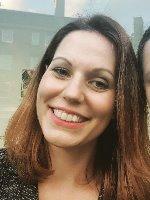Sally Cholewa is an Archivist at RBS. She attended AV Winter School 2020 with support from the DPC's Career Development Fund which is funded by DPC Supporters.
A day in the life of a Winter School for Audio-visual Archiving participant
8.25: Leave my accommodation and walk 20 minutes through a quiet residential area. Pass a house with 2 Peacocks and another with its own outdoor miniature railway which filled the whole garden.
8.45: Arrive at The Netherland Institute for Sound and Vision and go to the designated course room. Find the seat with my name plate. The tutors moved us every day to encourage discussion between different people. Tea and pastries.
9.00: First session of the day.
Give a 5-minute talk on my institution’s vision, current working practices, main challenges and support required in relation to our digital preservation practices. All attendees did this and it was great to hear from such a varied mix of organisations. Participants came from various places including Sound and Vision, Shell, Hong Kong Film Archive, The Irish Traditional Music Archive and The Olympic Foundation for Culture and Heritage. It was heartening to discover I was not alone in most of the experiences and challenges I face in relation to audio-visual preservation.
10.45: Break. Tea and pastries.
11.00: Second session of the day.
A session about an element of the OAIS reference model. The Winter School programme was structured around the standard and covered all the main themes; pre-ingest, ingest, data management, storage, preservation, systems, policies and administration. Though geared specifically towards audio-visual preservation the sessions were applicable to general digital preservation practices and processes as well.
12.30: Lunch provided in the Grand Café.
During the lunch break go on a tour of both the Sound & Vision media archive repositories and the ‘Audio-Visual preservation suite’. The depots were full of Dutch broadcasting memorabilia including beautiful old radios. I was very envious of the state-of-the-art preservation equipment they had access to.
13.30: Third session of the day.
A further session on an aspect of the OAIS model. There was a suitable mix of lecture style and small group discussions. Working in this manner really helped cement what we were learning and think about how it all related to our specific circumstances. Lots of brightly coloured post-its were used and lively debate was had.
15.00: Break. Tea and yes, more pastries.
Other healthier options were available, I just never sampled them.
15.15: Final session of the day.
A practical media file analysis session. I learnt how to use tools and applications such as BagIt, Rsync and VLC player. I was really surprised at how much I enjoyed learning about and navigating command lines. I do not have administration rights to access or use any of these tools in my workplace, but believe it is still important to possess a general understanding of them to enhance my digital preservation skills.
16.30: Guest speaker.
A guest speaker presentation about their specific approaches and solutions to themes we had been discussing that day. The speakers came from the British Film Institute, Národní filmový archiv (Czech Republic) and Sound and Vision. Though all these archives have substantially larger Audio-Visual collections than I work with it was helpful to see real life applied examples of what we had been learning.
17.30: Finish. Socialise
Attend welcome drinks and a dinner. The tutors joined in as well and it was a fun relaxed way to get to know everyone better. Building relationships in this way made discussions during the day easier and more open.
21.00: Back to the accommodation to rest up, ready for the next challenging, learning filled, immensely enjoyable day.
The Career Development Fund is sponsored by the DPC’s Supporters who recognize the benefit and seek to support a connected and trained digital preservation workforce. We gratefully acknowledge their financial support to this programme and ask applicants to acknowledge that support in any communications that result. At the time of writing, the Career Development Fund is supported by Arkivum, Artefactual Systems Inc., CAE Technology, Formpipe, Libnova, MirrorWeb and Preservica. A full list of supporters is online here.










































































































































